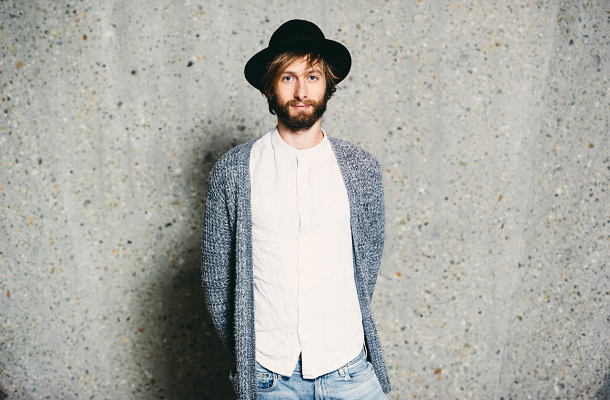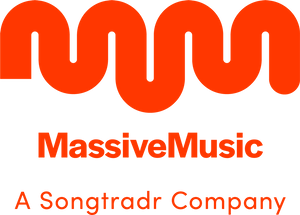
5 Minutes with… Moos Lamerus

By day Moos Lamerus works as global chief operating officer and partner at international creative music agency MassiveMusic in Amsterdam, fusing his love for music with his entrepreneurial spirit, but he’s got many more strings to his bow.
He’s been involved in the digital tech startup scene for years, has co-founded companies in his spare time and invested in a few others, and when he’s not absorbed in the music business he’s reading up on the latest developments in science.
Most recently he’s been swatting up on the science of happiness. In 2015 he started bringing together findings from the field of positive psychology and by the end of 2018 he’d drawn a lot of it together into a book: ‘Gelukkig maar | Een wetenschappelijke zoektocht naar geluk’ (In English: 'Fortunately | A scientific search for happiness', although it hasn’t yet been translated).
LBB’s Alex Reeves caught up with Moos to find out his thoughts on music, business and science.
LBB> Where did you grow up and what kind of kid were you?
Moos> I grew up in Amsterdam. I was a shy kid, doing my own thing but I generally got along very well with all the groups. I didn’t particularly fit in with one group. I hung out with the popular kids and the more nerdy, dorky kids.
I remember when I graduated from high school my mentor said: ‘Like he improvised on his piano, he improvised his way through education.’ It was a good summary because I always found my own path. Sometimes I worked hard and got good grades. Sometimes I was just being creative.
LBB> So music was a big part of your life from early on?
Moos> Yeah. That was all to do with my mum. I grew up with her in Amsterdam and she’d picked up the violin quite late, in her 30s, but she was motivated to learn and played a lot and rehearsed for hours a day. At least four nights a week it was live chamber music with a trio, quartet or quintet. I’d go to bed with chamber music live from the living room. As long as I can remember I’ve been infused with mainly classical and chamber music. But she was also a big fan of The Beatles.
She always regretted the fact that she started so late, so I had to make up for that and she forced me. I had to pick out an instrument and rehearse every day. At four I tried out the violin. It didn’t work, so I switched to play the drums but it was difficult with the neighbours. Then I found the piano when I was six: that’s how my formal training started for 12 years of classical music followed by other styles. My youth was piano rehearsal. Every day I had to sit behind it for 30 or 45 minutes. That could be a fight because I didn’t want to do anything with music, thought it was stupid and I just wanted to play outside. But my mother had good resolve so she stuck with it and now I’m very grateful.
LBB> When did you first consider going into working in music as a career?
Moos> When I was 15 I started picking up the guitar to play in bands. So trying to be a music professional started then. I was serious with my best friend about starting a band and trying to conquer the world and be world famous artists. We did that for years and years. We obviously didn’t succeed but we had a lot of fun.
LBB> What sort of music did you play?
Moos> This was ‘70s southern rock, some blues-infused rock-and-roll - all basically guitar-heavy.
When it became clear that the world famous artist thing wasn’t happening because of a lack of talent or discovering that you’ve romanticised what it’s like, then I started to look towards the industry as a professional, to work in it rather than being an artist. I was in my mid 20s when I actually started a career. Before that it was just college, touring and working behind a bar to make a living.
LBB> What did that early career look like?
Moos> I started as a project manager in the cultural sector, doing projects that tried to bridge between music and other creative disciplines like games and film. That’s when I got in contact with MassiveMusic as one of the leading parties being involved in both music and film.
I organised an event where we brought some interesting film composers and directors together in a cinema at the height of summer. It was hot outside and we were sitting in this dark little room. Not everything was as sparkling as it could be so I was kind of bored. Then MassiveMusic came on last. They’d just finished up Nike ‘Write the Future’ and they blew the whole thing off. It was such an amazing story how this film developed with all the artists they’d reached out to and tried, going all over the world in one epic adventure and they were selling it in a juicy way. Everybody was on the edge of their seat listening. I thought it was just epic.
I started chatting with the guys and the rest is history. It was serendipitous.
The first time I walked into the office I knew this is it. This is my future.
LBB> So fast forward to now. You’re global COO. What do your days look like in that role?
Moos> Every day is different. But what I try to focus on is highlighting all the talent we have worldwide and making sure that we keep improving our creative output. We can do that in many ways. Sometimes it’s about the tools we have; sometimes it’s about how we inspire each other. What I enjoy the most is being part of a big global family of music fanatics and trying to contribute to how this family can flourish.
LBB> Which recent projects are you most proud of at MassiveMusic and why?
Moos> We’re particularly proud of a short film that we’re just wrapping up with Tom Schlagkamp, a great director. It’s called ‘Disconnect’. I can’t say much more about it. But it’s so cool because we’re mainly involved with very short films - often 30 seconds - and it’s great to be part of a mini feature film. It’s also something that we did purely for the art. It wasn’t a commercial project. I’m really proud that we carved out time and resources to be able to work on something like this. Also, the end result is great. If it wins a few awards at film festivals that would be great, but that’s not why I’m proud of it. It’s the fact that we make a conscious choice to do this kind of project. For me, that’s what it’s all about.
LBB> Tell us about the book you've been writing about the science of happiness. Where did the idea come from?
Moos> I have an insatiable hunger for wisdom. So I devour a lot of books and online courses. Everything I can find. It’s mostly centred around what makes us tick as humans, what drives us and why we do the things we do. Sometimes it can be more general about the universe.
While I was devouring all these interesting books, mainly on science, I stumbled across a course ‘The Science of Happiness’ on edX at UC Berkeley. That really struck a chord because it’s a fundamental question about what makes us tick. I was also surprised that the scientific field of positive psychology was relatively young. It’s a really curious development in psychology and neuroscience. There’s a lot of pathology in there, so you study where things go wrong and then try to cure illnesses. It’s interesting that this field focuses on what makes someone flourish, how you can increase wellbeing. What is wellbeing? What is meaning?
This is difficult for science to study. You need the rigour etc. But for me it was very interesting that the scientific lens was now being put on this fundamental question. I felt there was more to discover and I wanted to dive in and do the research, to find out what the scientific literature has to say about this.
LBB> So you basically did a lot of reading?
Moos> Exactly. I did a bit of a preview of the scientific literature, so it’s not a self-improvement book. There are many out there that already cover that extensively. This is more about what science has to tell us about happy life and being more objective and nuanced in this. It’s not about making a point: ‘These are the three simple steps to lead a happier life.’ It’s more: ‘These are some topics that science has studied in depth around this subject. And here are some of the conclusions.’ With science it’s always very nuanced so they are not strong conclusions, just tendencies here and there. I want the reader to draw their own conclusions from it. My goal is to spark an interest in the topic and reflect on the material and on their lives.
LBB> Who are your creative heroes and why?
Moos> Because our topic is now a bit more intellectual I’ll talk about heroes in science. One really nice development is that there are now rising intellectual rock stars. There’s a group of individuals somebody gave an umbrella name that sound very ominous and stupid, but the name is the ‘Intellectual Dark Web’. There’s no formal connection between them. You can maybe see them as a movement about the search for truth and freedom of speech. These are guys like Sam Harris, Jordan Peterson, Bret Weinstein, Eric Weinstein, etc. These are all professors who advocate for freedom of speech. For some people when they hear these names like Jordan Peterson, they say, ‘isn’t he that guy that’s alt right?’ Not at all, but they are wildly misportrayed in a lot of the traditional media. These are such creative, clear thinkers in our day and age that they really deserve a platform and a large audience. They have found a large audience within their niche, so in that sense they are celebrities, stars, heroes. But they are not known to a larger audience. For me these are really inspiring figures how they try to dissect and analyse everything that’s going on, to make a stand. They are about something. But also how they do it, in a dialogue in the search for truth, using the tools of science in a very appropriate way. It’s about the body of knowledge, the weight of the evidence, many studies, meta analysis - only then can you say that a certain signal might arise from all those studies. They are very careful and clear thinkers and they talk with the science in mind about certain topics. From an intellectual point of view they are my heroes.
LBB> And when you're not researching happiness, what do you like to do in your spare time? Any other obsessions?
Moos> Next is music, that’s a lot of my time. And like I said I devour anything that explains the world around us. And to give you a sense of how diverse it is (and it might sound a bit pretentious), I’m now doing a course on the science of information with a mathematical strand. I’m also reading about the science of people in the workplace, how people can best work together and collaborate and make beautiful stuff. I’m also putting together a book which is a bundle of essays from leading neuroscientists on the latest in brain research. All that, with a cup of coffee, I’m a happy man.
‘Gelukkig Maar’ will be launched March 12th in the A’DAM Toren in Amsterdam and will be available online through De Kleine Pauw.













